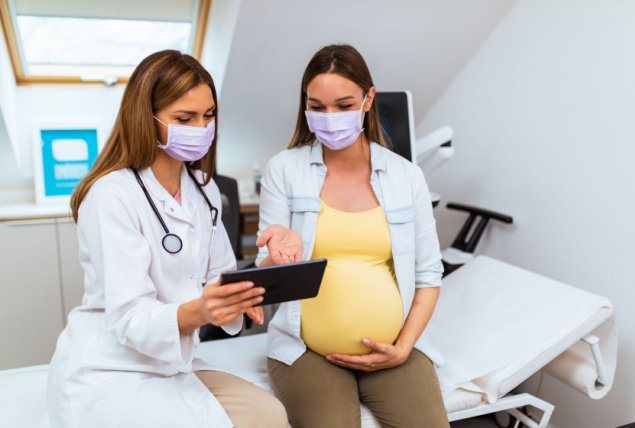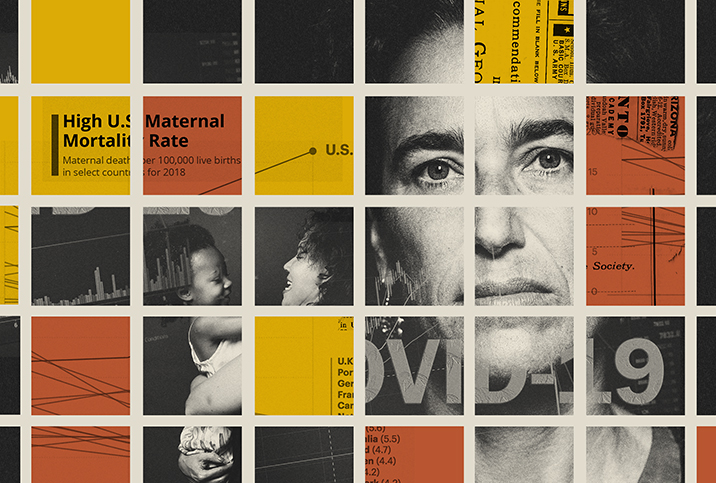U.S. Maternal Mortality Rates Have Dipped to Pre-Pandemic Levels

Key Points
- The maternal death rate in 2021 was the highest it's been in 50 years.
- A new report indicates the rate dropped to pre-pandemic levels in 2022 and 2023, but gaping disparities remain.
- Experts say more needs to be done to protect pregnant women and babies, as most deaths are preventable.
Several common health conditions during pregnancy can have lasting implications for women and their babies. Some complications can be deadly.
The number of maternal deaths in the United States—like most places around the world—spiked in the early days of the COVID-19 pandemic, but government data indicates fewer mothers died in childbirth or the postpartum period in 2022 or 2023 than in 2020 or 2021.
Although the positive trend is expected to continue, stark disparities remain.
What was the 2023 maternal mortality rate in the United States?
In 2022, 817 women died of pregnancy-related causes in the U.S. as compared to 1,205 in the year before, according to a 2024 report from the Centers for Disease Control and Prevention (CDC).
Maternal deaths are those that happen during pregnancy or within 42 days of delivery from causes related to or aggravated by pregnancy or its management, according to the World Health Organization (WHO).
In 2021, the U.S.'s maternal mortality rate—the number of maternal deaths per 100,000 births—was the highest it'd been in more than 50 years.
The leading causes of death from pregnancy-related conditions include:
- Blood vessel blockages
- Excessive bleeding
- Infections
The agency hasn't released its final report for 2023, but provisional data indicate about 680 women died of pregnancy-related causes last year, though the actual number may be lower. The agency reviews provisional data throughout the year and recodes some entries before issuing the final report. In 2022, provisional estimates were notably higher than the final number.
While the decrease is positive, research indicates the nation's maternal mortality rate is still higher than that of other wealthy countries, according to the Commonwealth Fund.
"In part, this is likely because the U.S. has higher rates of chronic illnesses, such as diabetes, heart disease and high blood pressure, that can cause pregnancy complications," said Christine Greves, M.D., an OB-GYN at Orlando Health Women's Institute Center of Obstetrics and Gynecology in Florida.
"Compounding this issue is the nation's lack of universal healthcare or adequate parental leave," said Jennifer Rousseau, D.N.P., an associate professor in the Department of Women, Children and Family Nursing at Rush University College of Nursing and Nursing Director for Family Connects Chicago at Rush University Medical Center in Illinois.
"Moreover, up to one-quarter of pregnancy-related deaths in the U.S. are attributable to mental health conditions, such as suicide or substance abuse," said Sara Twogood, M.D., an OB-GYN and a medical expert for the female health app, Flo Health, who is based in Los Angeles.
"Insufficient mental healthcare and the stigma around mental illness may make it harder to manage postpartum depression and other psychiatric conditions, further contributing to the problem," Twogood said.
Racial disparities and maternal mortality
The data also show that substantial racial disparities remain. The death rate of Black mothers in the U.S. is two-and-a-half times higher than that of white or Hispanic women.
"This is largely because of structural and systemic racism, which negatively impacts maternal health in various ways," said Todd Rosen, M.D., an OB-GYN at RWJBarnabas Health Medical Group and professor at Rutgers Robert Wood Johnson Medical School in New Brunswick, New Jersey.
Research indicates Black women are less likely to have access to clean air and water, healthy food, financial and housing security or quality healthcare, according to the CDC.
"Structural racism, implicit bias and variation in quality of healthcare are major contributors to worse outcomes in Black versus white women," Rosen said. "Black women also are more likely to have pre-existing cardiovascular disease, and they are more likely to experience complications like hypertensive disorders of pregnancy, which is one of the leading causes of serious morbidity and mortality in pregnancy."
About 84 percent of pregnancy-related deaths that occur before or during delivery or within a year postpartum are preventable, according to 2024 research by the CDC.
Recommended
- How to Monitor Yourself for Preeclampsia: Regular checkups can help expectant mothers identify symptoms of preeclampsia.
- What You Need to Know About Gestational Diabetes (GD): Learn how gestational diabetes can impact you and your baby.
- Postpartum Depression Affects Your Physical Health, Too: The symptoms of PPD can be debilitating both physically and mentally, so seek the help you need.
Why has the maternal mortality rate changed?
"The spike noted in 2021 was almost certainly solely attributable to COVID-19," Rosen said.
The virus was especially dangerous for pregnant women, who were more likely to get severely ill. More than 400 death certificates mentioned COVID-19 as a contributor to maternal deaths in 2021, compared to fewer than 10 in 2022, according to the CDC.
"The pandemic created gaps in routine pregnancy care, which may have led to delayed diagnoses of maternal health issues, making them more severe," Twogood said. "In 2022, factors such as routine COVID-19 vaccination for pregnant people and changes in the virus likely helped more women survive."
Additionally, there weren't as many disruptions to routine prenatal care or healthcare in general in 2022.
"When comparing maternal deaths in 2022 with data in 2020, there is also a small decrease, but this is likely representative of a return to baseline. This is positive news because we have moved away from pandemic-related, poor maternal health outcomes," wrote Verda Hicks, president of the American College of Obstetricians and Gynecologists (ACOG), in a 2024 statement responding to the CDC's report.
"It's also sobering because we are reminded, again, that we are nowhere near resolving the issue of maternal mortality, particularly when trying to close the gap on healthcare disparities," Hicks wrote.
Hicks noted that the Supreme Court's Dobbs decision in June 2022—which overturned Roe v. Wade and ended the constitutional right to abortion—is one factor that has worsened reproductive healthcare and may contribute to an increase in maternal deaths in the future.
"Abortion care is an essential component of maternal healthcare. ACOG remains concerned about a potential increase in maternal deaths in states where pregnant people are unable to access care, especially given the tragic reports of maternal morbidities that have resulted from untreated pregnancy complications," she wrote.
"When treating pregnancy complications, abortion care can be lifesaving, and withholding that care unquestionably compromises patient lives and outcomes."
Also of note, infant mortality rates rose in 2023 for the first time in decades, according to CDC data. Most deaths were attributable to maternal health problems or bacterial sepsis.
What are the warning signs of possible pregnancy complications?
"Make sure not to dismiss signs that might be considered trivial outside of pregnancy but can be indicators of a more serious disease like preeclampsia or infection," Rosen said.
"Sometimes patients and their providers don't pay enough heed to important signs, and they miss an opportunity to prevent serious disease or death."
The following symptoms may signal pregnancy complications:
- Baby's movement slowing or stopping
- Changes in vision
- Chest pain or rapid heartbeat
- Dizziness or fainting
- Extreme swelling in the face or hands
- Fever over 100.4 degrees Fahrenheit
- Headache that won't go away or gets worse
- Heavy vaginal fluid leaking or bleeding after pregnancy
- Overwhelming fatigue
- Severe and persistent belly pain
- Severe nausea or vomiting
- Severe swelling, pain or redness in your arm or leg
- Thoughts of harming yourself or your baby
- Trouble breathing
- Vaginal bleeding or fluid leaking during pregnancy
Rosen noted that pregnant women should inform their providers if they experience unusual symptoms right away, even if they think it's minor. If their provider doesn't respond quickly, try again or head to a doctor's office or hospital—preferably one with a designated maternity care unit—for evaluation. He also encourages folks to get a second opinion if they feel their healthcare provider isn't taking their concerns seriously.
"We encourage women and their families to remember the acronym POST-BIRTH and to call 911 for any symptoms related to pain in the chest or obstructed breathing, seizures or thoughts of harming yourself or someone else," Rousseau said.
"Call your healthcare provider if you have heavy bleeding, an incision that isn't healing, a red or swollen leg, a temperature over 100.4F or a bad headache."
What can someone do to better safeguard their health during pregnancy?
Some risk factors are uncontrollable, but there are several things people can do to have a better pregnancy.
"For one, it's crucial to have a prenatal risk assessment and get existing physical or mental health conditions under control early on in pregnancy, if not before conception," Greves said. "If you have a higher risk of complications, your healthcare team can take steps to mitigate it, including more frequent monitoring and specialized care."
Additionally, Twogood recommends pregnant women establish a robust network of support and resources as soon as possible.
"This includes doing research and choosing the best hospital for them, establishing care with a trusted team of healthcare providers—midwives, OB-GYNs, or both, depending on their underlying health and risk factors—and picking their go-to resources, such as doulas, medical websites, books, classes and support system," she said. "When a broad team is in place, more care can be provided."
Finally, Twogood explained that knowing what's typical versus unusual in pregnancy is helpful. She recommended becoming familiar with regular physiological changes and red flags and understanding what to do if warning signs appear.
The bottom line
"Improving maternal mortality rates requires a multipronged approach," Rosen said. "Addressing disparities not only in access to healthcare but many of the structural issues that affect the care of marginalized groups should be a top priority."
Many of these issues, including food deserts and structural racism, require work on the part of individuals, communities, governments and medical care systems, he added.
Although some pregnancy complications are unforeseeable, there are many steps pregnant women and healthcare providers can take to reduce the risk. If you're pregnant or planning to conceive, talk to your doctor for personalized guidance for a safe and healthy pregnancy.


















